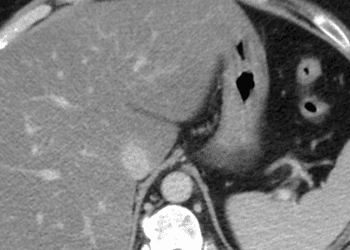Endoscopic biliary drainage in acute cholangitis [Classics Series]
Image: PD
1. For patients with severe acute cholangitis due to choledocholithiasis, endoscopic biliary drainage reduces hospital mortality compared to surgical decompression
2. Endoscopic biliary drainage is associated with fewer post-treatment complications compared to surgical decompression, although the decrease was not statistically significant for all types of complications
Original Date of Publication: June 11, 1992
Study Rundown: At the time of this study, surgical decompression was the conventional treatment for severe acute cholangitis arising from choledocholithiasis. Surgery, however, was associated with significant morbidity and mortality. Several uncontrolled studies had shown that endoscopic biliary drainage was a safe therapeutic alternative for acute cholangitis that reduced the rate of mortality. This study was the first randomized, controlled trial that sought to determine the benefits of endoscopic biliary drainage compared to surgical decompression for patients with severe acute cholangitis. Results demonstrated that endoscopic biliary drainage significantly lowered hospital mortality rates compared to surgical decompression. Endoscopic intervention also significantly reduced the rates of certain complications, including the rates of ventilator support and residual stones after procedure.
One potential study limitation is that patients randomized to receive surgical decompression experienced longer wait times before undergoing treatment compared to patients randomized to receive endoscopic biliary drainage. The treatment delay for the surgery group, on the order of a couple hours, was due in part to the limited number of immediately available operating rooms. This delay could have resulted in worsened cholangitis in the surgery group specifically, and may have potentially biased the study’s results in favor of endoscopic biliary drainage. On the other hand, these delays reflect the challenges in arranging emergent surgery that are faced in practice.
In summary, the findings of this study support the use of endoscopic biliary drainage as a safe and effective treatment for severe acute cholangitis due to choledocholithiasis. Endoscopic intervention significantly reduces hospital mortality compared to conventional surgical intervention.
Click to read the study in NEJM
In-Depth [randomized controlled trial]: Originally published in NEJM in 1992, this randomized, controlled trial enrolled 82 patients from the Queen Mary Hospital in Hong Kong. Eligible patients were those who were diagnosed with acute cholangitis due to choledocholithiasis based on the presence of septic shock or progressive biliary sepsis manifesting as mental confusion or antibiotic-refractory fever. All patients underwent emergency diagnostic endoscopic retrograde cholangio-pancreatography (ERCP) prior to randomization for endoscopic biliary drainage or surgical decompression. In the end, 41 patients were randomized to each treatment group. All patients received definitive therapy following biliary drainage. Mortality was defined as death within 48 hours after biliary drainage, in the absence of other contributory causes. Morbidity included any complications that arose after treatment. Cholangitis was considered to have resolved once body temperature and blood pressure were normalized for at least 8 hours. The mortality rate was significantly lower for patients undergoing endoscopic biliary drainage compared to patients undergoing surgical decompression (10% vs. 32%; p<0.03). The rate of complications was not significantly different between the two groups (34% vs. 66%; p>0.05). Only the rates of residual calculi and the ventilator support were significantly lower for patients receiving endoscopic drainage compared to surgery. The time needed to normalize body temperature and blood pressure was not different between patients receiving endoscopic biliary drainage and surgical decompression.
By Evan Chen and Andrew Cheung, M.D.
© 2012-2014 2minutemedicine.com. All rights reserved. No works may be reproduced without expressed written consent from 2minutemedicine.com. Disclaimer: We present factual information directly from peer reviewed medical journals. No post should be construed as medical advice and is not intended as such by the authors, editors, staff or by 2minutemedicine.com. PLEASE SEE A HEALTHCARE PROVIDER IN YOUR AREA IF YOU SEEK MEDICAL ADVICE OF ANY SORT.








